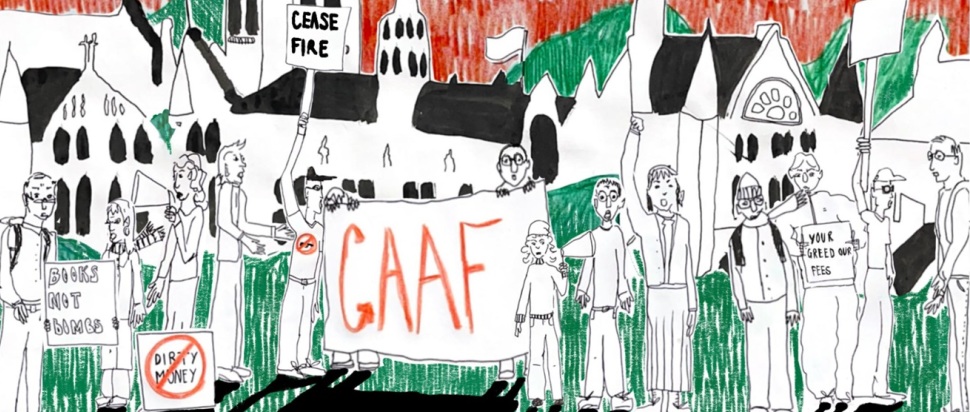An Education in Disruption: Divestment in higher education
From fossil fuels to arms, university funds have long been corrupt. We take a closer look at institutional complicity and the recent student-led campaigns organising against the system
On 6 February, a group of students draped in Palestinian flags filed out of 11 University Gardens on the University of Glasgow campus followed by a squad of university security. Addressing the crowd gathered outside, they read aloud from a prepared speech: “We did not do this occupation out of naivete, or because we thought it’d be fun [...] We see divestment from arms as essential and necessary. Palestinians are being murdered with arms that our university pays for. The university is complicit in genocide, it is funding genocide.”
The University of Glasgow is not the first to come under fire from its own student population for its investments and partnerships. Student campaigners have been working to disentangle higher education institutions from harmful industries and entities for decades, from South African apartheid to fossil fuel extraction. In doing so, activists aim to both incur a material reduction of capital to such companies, as well as shape public opinion through eliciting public statements of condemnation from universities.
These tactics have seen particular success amongst student environmentalists, with, according to People and Planet, nearly 75% of UK universities having made commitments to divest from fossil fuels, setting a clear precedent for other campaigns. National campaign Divest Borders targets university relationships with companies which prop up the UK border industry through detention and surveillance technologies such as Accenture, Microsoft, Mitie and Elbit. The campaign’s coordinator, Andre Dallas, says, ‘‘Institutions now cannot deny the relevance of moral considerations in financial policy-making decisions, and this provides opportunities for campaigners to demand that the same logic be applied to other unjust activities such as bordering, the arms trade and Israeli apartheid.”
While many universities have ethical policies in place preventing relationships with industries like pornography or tobacco, many routinely accept donations, funding and sponsorships from huge weapons suppliers and manufacturers such as Lockheed Martin, BAE Systems, Raytheon, Rolls Royce and Thales. These relationships can often be reciprocal; these companies are platformed at careers fairs while cutting edge research projects at top universities feed into the manufacturing of weapons worldwide, intimately connecting the education sector with international violence.
Calls for universities to 'demilitarise' – divest and disassociate from arms companies – are often explicitly articulated through the language of Palestinian liberation, and global attention on Gaza since October 2023 has galvanised these campaigns into action. The last five months have seen major student action in Manchester, York, Cambridge, and London, in protest of research, recruitment and financial ties with companies complicit in Israeli violence.
Glasgow Against Arms and Fossil Fuels (GAAF), the group behind the occupation, says, “We are observing universities becoming and acting increasingly like private companies [...] As a result, we live in a reality where academic institutions like the University of Glasgow feel inclined and have no issues with investing, colluding and profiting even from genocide.” According to GAAF, the University of Glasgow has received £26,294,744.75 from projects involving arms companies since 2017, and partners with BAE Systems and QinetiQ who produce weaponry and aircraft used in Gaza. The occupation – beginning on 22 January – was a result of a growing sense of disgust at the University’s lack of public condemnation of Israeli violence, particularly after the death of Palestinian alumna Dima Alhaj, and repeated dismissal of GAAF’s campaigning.
Despite an open letter of support for the peaceful occupiers from staff, the eviction on 6 February was drawn-out and hostile. After hours of negotiation, the occupation ended after management agreed to set up a working group and continue discussions of the group's demands. GAAF seemed optimistic about future negotiations but they’re clear that if demands aren’t met, their direct action will continue.
Beyond higher education, the wider divestment movement itself faces the threat of government repression. The spike of public condemnation of Israel since October resulted in the Economic Activity of Public Bodies (Overseas Matters) Act, known colloquially as the 'anti-BDS bill', which cleared The Commons on 10 January. It prevents public authorities from being influenced by 'political or moral disapproval' of certain countries or states, specifically Israel, but it has already raised alarm bells amongst environmental and human rights campaigners, like Friends of the Earth, as an attack on a well-trodden tactic to influence global change.
While campaigns against industries and companies rather than governments shouldn’t be affected, Dallas warns that “given the government's consistent stances against migrant and climate justice, it wouldn't be a shock if the vagueness of the language were exploited to allow for wider application.” Should this come to fruition, it threatens both the right to non-violent protest and a crucial site of politicisation.
Universities have long acted as hotbeds for youth activism, allowing students to affect impactful change which complements other disruptive actions within a national movement. These student campaign spaces are vital in targeting institutional complicity in global injustice, showing that we can and should demand change – in higher education and beyond.
